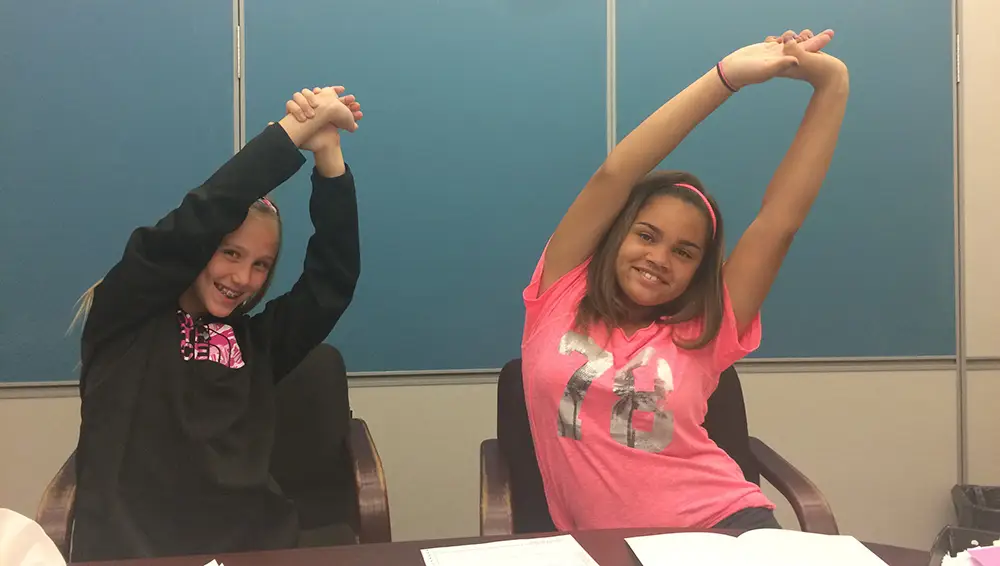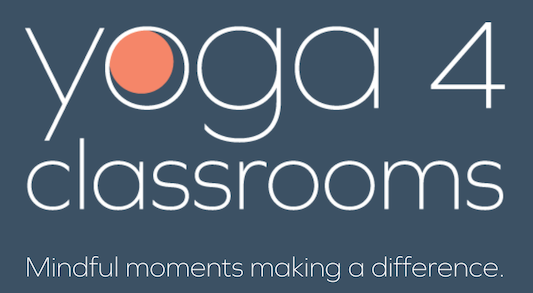
|
Check out our brand new product-- Yoga 4 Classrooms Tee! Wear Your Mindfulness With Pride!
|

Saturday, May 26, 2012 (Updated July 2021)
Do a simple web search about yoga and mindfulness for children, and you will be faced with an array of enthusiastic resources speaking about the benefits and effectiveness of yoga and mindfulness-based programs and interventions in various settings, from educational to clinical, to family. Our personal experience as yoga practitioners, parents and teachers provides us with clear evidence of the benefits of yoga for kids. So, why should we care about scientifically rigorous research published in respected peer-reviewed journals? Because we need research to move the perception and show the scientific validity and effectiveness of yoga in school settings.
Angela Wilson reflected on The Transformative Potential of Science: How research can bring yoga into the world in Yoga Therapy Today (Spring 2011). The leading research center for yoga in the US is the Kripalu’s Institute for Extraordinary Living, which, as she mentions, “aspires to create a world in which Yoga is scientifically and experientially validated as a practice that can awaken the human beings’ innate capacity for self-healing and awareness. We envision a world…in which, as a result of this scientific validation, all people…will have unmitigated access to Yoga – in their schools, in their work environments, and in their healthcare choices.” Wilson argues that through the lenses of scientific tools and language more people will have access to the transformative benefits of yoga practice.
A prominent researcher, Dr. Sat Bir Khalsa of Brigham and Women’s Hospital, Harvard Medical School and the Research Director of Kripalu Center for Yoga and Health, says in his article published in the International Journal of Yoga Therapy that anecdotal evidence and mere popularity of yoga and meditation in our society are insufficient. He calls for more funding support for these scientific investigations: “Yoga research will ultimately provide the basis and the support for incorporating Yoga-based practices into our schools and into our healthcare system. Granted, this will take time as we await the necessary critical mass of Yoga research and replications of these studies by different investigators in different institutions on different populations in different settings.”
True to these objectives, Dr. Khalsa and his collaborator, Dr. Jessica Noggle, published two preliminary papers as a result of their research on implementing a yoga program for secondary school children. Their investigation employed randomized controlled trial methodology, which means students were randomly assigned to either regular physical education classes or to yoga classes over a single semester.
The first paper, published in the Journal of Behavioral Health Services and Research in January 2012, reported that yoga participants showed statistically significant differences over time relative to controls on measures of anger control and fatigue/inertia. The researchers conclude that these preliminary results suggest that implementation of yoga is acceptable and feasible in a secondary school setting, and has the potential of playing a protective or preventive role in maintaining mental health.
The second paper was published in the Journal of Developmental and Behavioral Pediatrics in April 2012. It focused on reporting the additional analysis of the battery of psychological tests on mood problems and anxiety. Although positive affect remained unchanged in both randomly assigned groups, negative affect significantly worsened in controls while improving in yoga students.
As we are facing the increasing implementation of yoga in school settings, more studies are being conducted and more results shared (see our Supporting Research page). Most of these have been a single group trials or were done in special populations that are not easily generalizable to the larger public. The above-mentioned studies and others since have aimed to fill this gap by employing an exploratory evaluation methodology to identify which psychological constructs may be useful to include in future studies assessing the psychological benefits of an in-school yoga program.
The anecdotal benefits of yoga reported by practitioners are well known, and now (2021) carefully-controlled scientific research on these benefits is growing. Therefore, these publications in published in respected peer-reviewed journals are extremely uplifting and reassuring. Supported by yoga research conferences and NIH grants, and with esteemed researchers and an abundance of preliminary data in place, the yoga research field as a whole is bound to achieve its mission of moving yoga from being perceived as anecdotally beneficial to being accepted as scientifically valid and to disseminating information about its effectiveness. The acceptance of the International Journal of Yoga Therapy into PubMed in the mid-2000s was a notable accomplishment in this regard.
Kelly McGonigal, Ph.D., Editor in Chief of the IJYT, and well-respected Stanford-based health psychologist, lecturer, researcher, and author, presented at the Yoga Service Collective’s (formerly the Yoga Service Council) first annual Yoga Service Conference at Omega Institute. She inspired an audience of 170 leaders working to bring yoga to underserved and at-risk populations with her presentation: Science and Service: Yes, YOU! Can do Research, offering a new website loaded with helpful research resources. This type of transparency and accessibility to resources can also be found at the growing Yoga Activist website. Add to that a refreshing attitude of collaboration and community as experienced at the Yoga Service Conference, and promoted by the work of organizations such IAYT and IASYM (International Association of School Yoga and Mindfulness), and it becomes clear the field of yoga research is going to grow dramatically in the coming years.
With the launch of the Research Repository: Yoga, Meditation and Mindfulness for Children, Adolescents and in Schools in 2016, Yoga 4 Classrooms continues to consolidate the findings from scientific studies as we strive to empower students and educators to create positive, peaceful, productive classrooms that support exceptional learning and a lifetime of health and wellness. With this core mission in mind, Yoga 4 Classrooms partnered with a University of Massachusetts-Lowell Department of Exercise Physiology research team in a pilot study to determine the effects of a classroom yoga and mindfulness program on academic performance, mood, behavior, attention/focus, stress, and wellness lifestyle choices, as well as physiological changes in the immune function that may occur as a result of the yoga intervention.
Yes, it’s been said we have bitten off more than we can chew, but it’s important to keep in mind that any and all types of studies done, regardless of the result, do tell us ‘something’ and really that’s the point of research. Study outcomes do not always show ‘this benefits that’, but they often provide us improved perspective and sometimes unexpected outcomes that guide us to better research design and/or insight we would not have thought of before. That is our intention. We are seeking to add to the experimental level of studies going on as related to yoga and schools and hopefully encourage others to do the same in the process.
You can find the results of our pilot investigation of the effectiveness of yoga in school and other studies that have featured Yoga 4 Classrooms as an intervention here and other relevant studies here. The critical mass of research is being built up in the scientific literature. We honor all those working so diligently to ensure yoga and mindfulness continue to grow in acceptance as a respected wellness modality, and ultimately as an important, beneficial part of every child’s school experience.
| Cookie | Duration | Description |
|---|---|---|
| cookielawinfo-checkbox-analytics | 11 months | This cookie is set by GDPR Cookie Consent plugin. The cookie is used to store the user consent for the cookies in the category "Analytics". |
| cookielawinfo-checkbox-functional | 11 months | The cookie is set by GDPR cookie consent to record the user consent for the cookies in the category "Functional". |
| cookielawinfo-checkbox-necessary | 11 months | This cookie is set by GDPR Cookie Consent plugin. The cookies is used to store the user consent for the cookies in the category "Necessary". |
| cookielawinfo-checkbox-others | 11 months | This cookie is set by GDPR Cookie Consent plugin. The cookie is used to store the user consent for the cookies in the category "Other. |
| cookielawinfo-checkbox-performance | 11 months | This cookie is set by GDPR Cookie Consent plugin. The cookie is used to store the user consent for the cookies in the category "Performance". |
| viewed_cookie_policy | 11 months | The cookie is set by the GDPR Cookie Consent plugin and is used to store whether or not user has consented to the use of cookies. It does not store any personal data. |

Sign up for our newsletter to get mindfulness tips, classroom tools, and exclusive offers—delivered straight to your inbox.
✨ Join now and get 10% off your first order! ✨